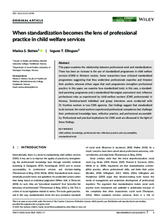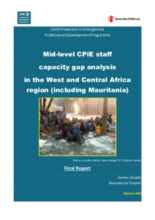Displaying 151 - 160 of 505
In this paper, the authors examine how standardized tools, in this case, a standardized parenting programme and a standardized Norwegian assessment tool, influence professional roles as experienced by child welfare workers (CWS professionals) in Norway.
This study examined 20 recent serious case reviews that had taken place in England where neglect was a feature. The purpose of this study is to explore the barriers which exist for social workers in England in identifying and responding to neglect in a timely, appropriate and effective manner.
This practice paper focuses on improving cross-sectoral relationships between child protection and child and family welfare practitioners, who are often required to work together to keep children and families safe.
The child protection in emergencies (CPiE) capacity gaps analysis (CGA) in the West and Central Africa (plus Mauritania) region, targeting CPiE practitioners with 3-5 years of professional experience, aimed to collect and provide information on (1) identified key CPiE capacity gaps and (2) existing and available capacity building initiatives.
This study examined the outcomes of a training aimed at enhancing child welfare practitioners’ use of data from the the Ontario Looking After Children (OnLAC) project for service planning related to young people’s educational outcomes.
This booklet serves as a companion resource for the Core Elements of Success in OVC Care: Self-Assessment Tool, developed by CAFO.
The goal of this study is to examine child welfare caseworkers’ experience of secondary traumatic stress (STS) and the extent to which coping strategies act as a buffer.
The goal of this study is to examine child welfare caseworkers’ experience of secondary traumatic stress (STS) and the extent to which coping strategies act as a buffer.
This study examined whether caseworker demographic factors, attitudes towards evidence-based practices (EBPs) and organizational factors predict caseworker referrals. Relying upon tenets of the Theory of Planned Behavior, this study also examined whether intention to refer predicts caseworker referrals to an EBP.
This toolkit is designed for parents/caregivers and the social service workforce guiding them. It provides practical tips that can be implemented quickly and mini lessons on topics of importance to anyone raising or supporting a child.




